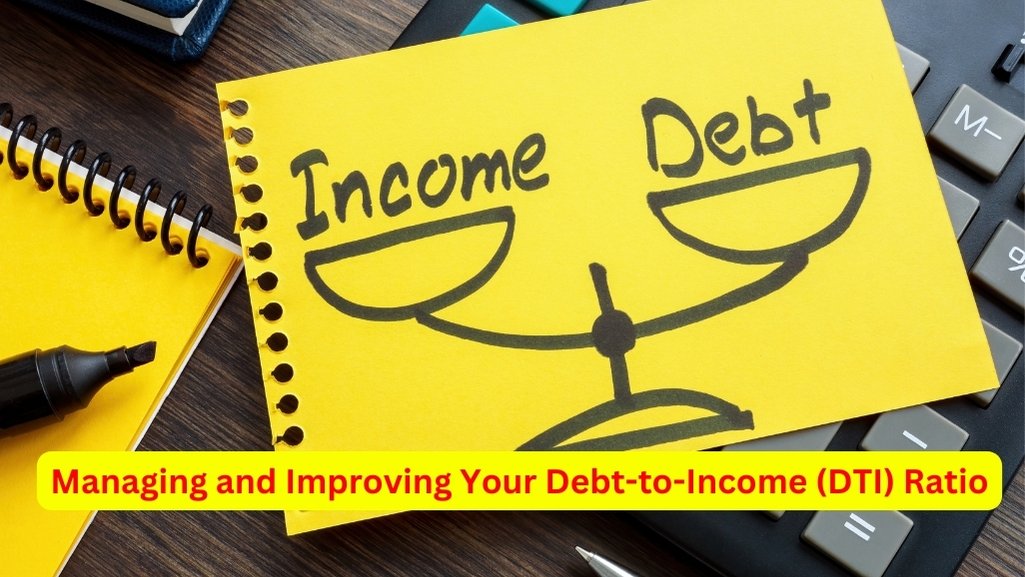Our previous series explored why the Debt-to-Income (DTI) Ratio is essential in personal finance. Now, it’s time to roll up our sleeves and get into the practical aspects of managing and improving your Debt-to-Income (DTI) Ratio.

Practical Aspects of Managing and Improving Your Debt-to-Income (DTI) Ratio
A. Strategies for Reducing Debt
1. Debt Consolidation
Debt consolidation is a powerful tool for managing multiple debts, especially if you have high-interest loans or credit card balances. Here’s how it works:
- Debt Consolidation Loan: Consider taking out a consolidation loan with a lower interest rate than your existing debts. Use this loan to pay off your high-interest debts, leaving you with a single, more manageable monthly payment.
- Balance Transfer Credit Card: Another option is transferring high-interest credit card balances to a card with a lower or 0% introductory interest rate. It can save you money on interest and simplify your debt management.
2. Budgeting and Cutting Unnecessary Expenses
Creating and sticking to a budget is a fundamental step in reducing debt. Here’s how you can get started:
- Track Your Expenses: Monitor your spending to understand where your money goes. Use budgeting apps or spreadsheets to help you visualise your financial habits.
- Save by Cutting Expenses: Discover areas to spend less. It might include dining out less, cancelling unused subscriptions, or finding more cost-effective alternatives.
B. Increasing Income
1. Negotiating a Salary Raise
Increasing your income can significantly impact your DTI. Negotiating a salary raise at your current job or seeking higher-paying job opportunities can provide a substantial boost. Here’s how to approach it:
- Research Market Salaries: Understand the salary range for your position and industry. This knowledge will help you make a strong case for a raise.
- Highlight Achievements: Prepare a list of your accomplishments and contributions to demonstrate your value to your employer.
- Practice Negotiation Skills: Be prepared to negotiate effectively. Practice how you talk and make deals with someone you rely on, like a close friend or mentor.
2. Exploring Additional Income Streams
In addition to your primary job, explore ways to generate extra income:
- Supplementary Earnings: Consider launching a side business or working on freelance assignments for added income. The gig economy offers various opportunities to supplement your income.
- Passive Income: Investigate passive income sources, such as investing in shares and real estate or creating an online course.
C. The Role of Financial Planning
1. Creating a Debt Repayment Plan
A structured debt repayment plan is essential for tackling your debts systematically:
- List Your Debts: List all your debts, including balances, interest rates, and minimum payments.
- Prioritise High-Interest Debts: Focus on paying off high-interest debts first, as they cost you the most over time.
- Snowball or Avalanche Method: Pick a method to pay off your debts that works for you. The snowball method involves paying off the smallest debts first for quick wins, while the avalanche method focuses on high-interest debts.
2. Setting Achievable Financial Goals
Setting specific and achievable financial goals can motivate you to manage your DTI effectively:
- Short-Term Goals: These goals may include paying off an outstanding credit card or reducing a specific debt by a certain amount within a year.
- Medium-Term Goals: Aim for goals like saving for a down payment on a home or funding an emergency fund.
- Long-Term Goals: Plan for retirement and build long-term wealth by investing wisely.
By employing these methods and blending them into your financial strategy, you can take action to decrease your debt, raise your earnings, and ultimately enhance your DTI.
Final Words
As we conclude Series 4 of our exploration into Debt-to-Income Ratio (DTI), we’ve ventured into the practical side of managing and improving your Debt-to-Income Ratio (DTI). These strategies for reducing debt, increasing income, and incorporating financial planning can significantly impact your DTI.
Debt consolidation offers an efficient way to streamline multiple debts while budgeting and cutting unnecessary expenses, and it provides the foundation for a solid financial strategy. On the income side, negotiating a salary raise and exploring additional income streams can substantially boost your economic well-being.
The role of financial planning must be recognised. Creating a debt repayment plan and setting achievable financial goals are vital steps towards achieving a more favourable DTI and, by extension, a healthier financial future.
Mastering these strategies and weaving them into your financial planning will empower you to proactively reduce debt, boost income, and improve your DTI.
In the next series, we’ll explore how lenders use DTI to assess loan applications and its indirect impact on your credit score. So, stay tuned for more valuable insights into managing your financial health through the lens of DTI.
